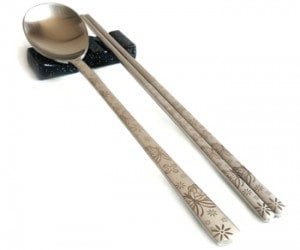Words by John Britton
 For those coming from Western society, one thing is quite apparent here in Korea: there are very few signs of an obesity epidemic. People here, for the most part, are simply not as overweight as those in almost all Western countries. But how do they do it?
For those coming from Western society, one thing is quite apparent here in Korea: there are very few signs of an obesity epidemic. People here, for the most part, are simply not as overweight as those in almost all Western countries. But how do they do it?
1. Stick to the (chop) sticks! For the most part, we eat faster with a spoon or fork. Chopsticks force us to take smaller bites, prolonging our meals. As we eat slower, we have time to fill up and sate our hunger with a smaller portion of food.
2. Eat Korean At Korean restaurants you’ll find your portion sizes to be much smaller than Western places that serve Western sizes. Korean restaurants will also proudly keep to tradition and offer side dishes of kimchi and other healthy vegetables.
3. Skip the bap, eat the kogi! Rice, a complex carbohydrate, is broken down when ingested and is eventually turned into glucose (sugar). It’s true—rice gives you a lot of unnecessary calories you don’t need. Meat, on the other hand, is full of protein and fat. Remember: fat won’t make you fat! (Carbs will.) Instead, that protein and fat will fill you up and keep you full longer than carbs do—along with repairing muscle tissue from your last killer workout.
4. Stay on the outer edges of the supermarket If you walk around the outside walls of your traditional market, you’ll notice this: that’s where the freshest food lives. That includes eggs, vegetables, fruit, dairy and meat. On the inside aisles you’ll find food that is processed, packaged and sometimes can spend years on those shelves.
5. Coffee: Short names! That grande-skinny-mocha-light-whip-soy-latte may have you thinking you’ve modified it to be healthy, but instead it’s just replaced a lot of ingredients with processed substitutes. Instead, the shorter the name, the better: Americano. Latte. Espresso. Insist on no sugar (설탕없이: seol-tang op-shi). You’ll still get the good stuff (caffeine) and avoid the really unneeded extras.
John Britton is the Head Coach of Reebok CrossFit Sentinel Uptown and a Reebok Sponsored Athlete. He’s been living in Korea over two years and has been working to get people fitter for over six years.
====




